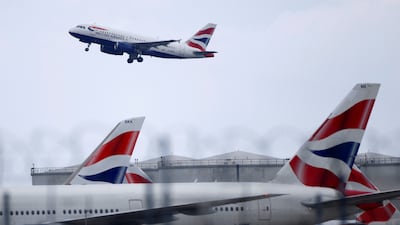Heathrow Airport urged the British government to accelerate the transition to sustainable aviation fuels (SAFs) before the Cop26 environmental summit, as passenger numbers remain well below pre-pandemic levels.
The UK’s busiest airport called on policymakers “to show leadership” and scale up the production of SAFs by putting in measures such as a progressively increasing mandate, a price support mechanism and loan guarantees.
Heathrow chief executive John Holland-Kaye said on Monday that the aim should be “for 2019 to have been the peak year for fossil fuel use in global aviation”.
“The UK government can show real leadership in decarbonising aviation at Cop26, by setting a progressively increasing mandate and a plan to use contracts for difference to accelerate the transition to sustainable aviation fuel in the UK, which will protect the benefits of flying for future generations,” Mr Holland-Kaye said.
Heathrow’s call for action came after global airlines adopted an International Air Transport Association resolution to reach net-zero carbon emissions by 2050.
The target will cost nearly $2 trillion by 2050 and will require "very significant financial investment", Willie Walsh, director general of Iata said earlier this month.
Heathrow said it was “delighted” by Iata’s decarbonisation commitment, which it considers a key milestone to securing a global agreement at the International Civil Aviation Organisation Assembly in September next year.
The London airport, the busiest in Europe in the run-up to the pandemic, has suffered a sharp decline in passengers as a result of Covid-related travel curbs.
Just 2.5 million holidaymakers flew out of the travel hub in September, which equates to 40 per cent of pre-pandemic levels, while North American traffic is only at 25 per cent of 2019 levels.
Cargo, carried in the hold of passenger planes, was close to 8 per cent down by volume on 2019, reflecting the extent travel restrictions also affect UK exports and supply chains.
This was far below EU rivals that experienced a stronger resurgence in passenger numbers over the summer, said Heathrow.
The airline industry has suffered heavy losses throughout the pandemic, but Iata estimates that passenger numbers are on track to surpass pre-pandemic levels by 2023.
Demand for domestic flights is leading the recovery, the organisation said, and is expected to reach 93 per cent of pre-crisis levels in 2022.


